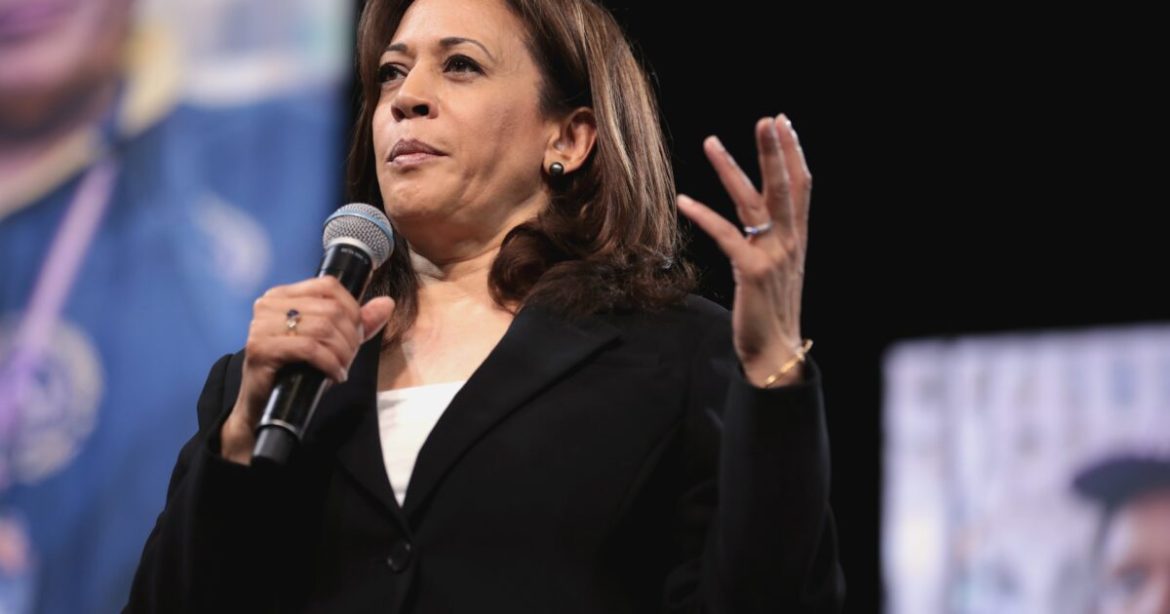

Former Vice President Kamala Harris has hinted she may run for president again in 2028.
In an interview with the BBC’s Sunday With Laura Kuenssberg, Harris said she was “not done” with public service and that it’s “possible” a woman president could still be her. The remarks came during a media tour for her new book recounting her 107-day 2024 campaign.
Harris said she has made no formal decision about 2028 and brushed off polls showing her trailing other potential Democratic contenders.
Earlier this year, she declined to run for governor of California, saying she wanted to focus on national issues instead.
During the BBC interview, Harris criticized corporations, universities, media outlets, and law firms for “capitulating” to President Trump’s demands, citing ABC’s suspension of Jimmy Kimmel after comments he made about conservative activist Charlie Kirk’s assassination. But such remarks are likely to alienate voters.
Few people appreciate being insulted by a candidate seeking their support, and her criticism of popular Trump policies signals a return to the unpopular priorities of the Biden years, woke ideology, DEI mandates, climate alarmism, and race-based hiring and promotions.
By aligning herself against policies that much of the country now supports, Harris may once again hand the presidency to Republicans.
Ironically, her husband Doug Emhoff’s law firm, Willkie Farr & Gallagher, made a $100 million pro bono pledge to causes backed by Trump’s administration, a move Emhoff said he personally opposed.
Harris appears deluded about how poor a candidate she actually is. She has never won a primary. In 2020, she dropped out of the Democratic race in December 2019 before any votes were cast, citing a lack of funding.
At her peak, after confronting Biden in a June debate, she briefly reached 15 percent support, but by December her numbers had collapsed to between 3 and 8 percent.
Even in her home state of California, she fell from 19 percent in July to just 8 percent in September. A Democratic pollster summed it up: “I don’t think anybody can figure out what her message is.” Her campaign was plagued by infighting, money troubles, and disjointed messaging.
In 2024, she became the nominee by default when Biden withdrew from the race in July, meaning she never faced a full primary contest or earned the support of Democratic voters state by state.
Her campaign was driven almost entirely by negative partisanship, people voting against Trump rather than for her.
That’s a critical weakness because negative partisanship doesn’t build enthusiasm or a lasting coalition. It’s temporary and dependent on the presence of a hated opponent.
Another important point is that Trump will not be running in 2028. It is possible that J.D. Vance will get the nomination, or another Republican, because unlike the Democrats, the Republicans will actually have a primary, rather than installing a candidate in the middle of the night.
Even if Vance wins the nomination and is seen as a continuation of Trump’s policies, he is not hated on the same scale that Trump is. That means Harris would have to win on merit, something she completely lacks.
Love him or hate him, President Trump has delivered on his campaign promises, and it was those promises that got him elected. His Republican successor will ostensibly pledge to maintain them.
The economy dominated voter concerns. Sixty-seven percent said the economy was in bad shape, and 45 percent felt financially worse off than four years ago. Inflation is down 67% from Biden’s peak.
Immigration ranked fourth nationally, behind democracy and the economy, but it was a decisive issue in battleground districts and among Hispanic voters, 71 percent of whom supported tougher border security.
Illegal crossings are down 95 percent, with monthly apprehensions at their lowest levels since the 1960s.
As of late October 2025, more than 515,000 deportations and over 485,000 arrests have occurred under the Trump administration. Separately, an estimated 1.6 million people have self-deported, meaning they left the U.S. voluntarily.
Trump’s trade and foreign policy remain firmly rooted in “America First.” He continued his tariff strategy and secured major trade wins with partners including the EU, UK, Vietnam, Indonesia, the Philippines, Japan, and South Korea.
Japan, South Korea, and the EU accepted 15 percent tariff rates after pledging to invest or purchase billions of dollars’ worth of U.S. goods.
He also pushed to classify Mexican cartels as foreign terrorist organizations and authorized U.S. military operations against narcotraffickers in the Caribbean and Pacific.
Trump’s diplomacy has produced results abroad and stability at home. In October 2025, he brokered a historic Israel-Hamas ceasefire that freed the remaining hostages and ended the war.
Other ceasefires soon followed, including Armenia-Azerbaijan and India-Pakistan, Thailand-Cambodia, while U.S. airstrikes on Iran in June forced a quick end to hostilities.
Domestically, he declared “armed conflict” against the crime, deployed the military in major cities, and oversaw a sharp drop in crime nationwide.
Violent crime fell more than 10 percent and homicides 20 percent between January and July 2025, while National Guard deployments in Washington, D.C., and Memphis cut murders by up to 25 percent.
Trump has also dismantled “woke” across the government. He cut federal funding to schools pushing critical race theory and gender ideology, ended DEI programs in the military and civilian agencies, and reinstated traditional standards of merit and discipline.
His January 20 executive order eliminated DEI mandates across the entire federal government, reversing Biden’s policies and removing the ideology from education, defense, and diplomacy. Consequently, military recruitment is now at record levels.
Trump has delivered on these promises, meaning that whoever the Republican candidate is, he will be able to make a strong argument that he will maintain these popular policies.
Meanwhile, Harris will likely run on a platform of undoing them, a strategy that will almost certainly cost her the election.
In short, Kamala is right: it would be best for the nation if she got the nomination, because that would mean four more years of Trump’s winning policies
The post Kamala Harris Is Considering Another Run – Handing the Presidency to Republicans appeared first on The Gateway Pundit.

